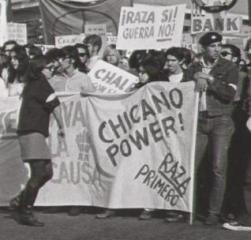Rise of the Chicano Identity
 As we all know, the Mexican identity didn't completely fall by the wayside during the Mexican assimilation period. The civil rights movement, while being the movement most recognized by the media mainstream, hid the revolutionary sides of many oppressed people. Much like the black nationalist movement, Mexicans in the United States became energized by a movement called the Chicano movement. This movement was one of cultural solidarity, recognition, and ultimately a realizing of their new identity here in America. Basically, generations of oppression and cultural denial exploded This new movement sough the reclaim their lost identity using all modes of discourse - using revolutionary ballads in their ancestral tongue and in the Anglo-American discourse.
As we all know, the Mexican identity didn't completely fall by the wayside during the Mexican assimilation period. The civil rights movement, while being the movement most recognized by the media mainstream, hid the revolutionary sides of many oppressed people. Much like the black nationalist movement, Mexicans in the United States became energized by a movement called the Chicano movement. This movement was one of cultural solidarity, recognition, and ultimately a realizing of their new identity here in America. Basically, generations of oppression and cultural denial exploded This new movement sough the reclaim their lost identity using all modes of discourse - using revolutionary ballads in their ancestral tongue and in the Anglo-American discourse.
Cultural Solidarity and Reclamation
 What stood in the way of the early Chicano's reclaiming of their lost identity? Well quite simply, there was too much cultural loss that had occurred for their to be a complete mirroring of the literacy/identity practices of their ancestors. This gap could only be filled by the realizing a new identity within the confines of American society. This identity formed around the one thing that was outside the physical world of loss they were experiencing - their language. Language provided an identity and without it they were lost. Well, what is the primary medium of language development in America? It's schools! So naturally, Chicano activistists set about their cultural reclaiming ways by targeting these institutions that had long resulted in deep cultural loss for their people. Heres a video of Chicano student activists doing their thing in the 1960's:
What stood in the way of the early Chicano's reclaiming of their lost identity? Well quite simply, there was too much cultural loss that had occurred for their to be a complete mirroring of the literacy/identity practices of their ancestors. This gap could only be filled by the realizing a new identity within the confines of American society. This identity formed around the one thing that was outside the physical world of loss they were experiencing - their language. Language provided an identity and without it they were lost. Well, what is the primary medium of language development in America? It's schools! So naturally, Chicano activistists set about their cultural reclaiming ways by targeting these institutions that had long resulted in deep cultural loss for their people. Heres a video of Chicano student activists doing their thing in the 1960's:
Rigid Boundaries of an Oppressed Identity
 Ever been ridiculed because you said y'all or did speak "proper" English? Well it works the same for Spanish speakers. Basically, you were a sell-out if you didn't speak Spanish fluently or spoke a broken form of Spanglish. All those years of being told their ancestral tongue was a lesser form of communication caused a sort of hyper-protectionism of the cultural literacy. Not speaking it "properly"pushed you outside the Chicano boundaries and into the assimilated Mexican-American world. A sort of oppositional literacy discourse developed. The language of the barrio was a valued cultural marker of the Chicano discourse, while intermixing of discourses (i.e Spanglish or broken English/Spanish) were frowned upon. Whats funny is that the primary language of change and movement for the Chicano movement was English. This intense protection of culture resulted in a sort of "othering" of anything seen as outside the cultural norms of discourse. Literature, musica and the arts were only considered Chicano if they fit the guidelines of this newly imagined identity. However, this super intense protecting of the identity was pushing the identity towards a cross-roads of no return, because what happens to an identity when the people within its boundaries claim other alternate identities? The advent of hybrid identities and post-modern thinking would help usher in this new era.
Ever been ridiculed because you said y'all or did speak "proper" English? Well it works the same for Spanish speakers. Basically, you were a sell-out if you didn't speak Spanish fluently or spoke a broken form of Spanglish. All those years of being told their ancestral tongue was a lesser form of communication caused a sort of hyper-protectionism of the cultural literacy. Not speaking it "properly"pushed you outside the Chicano boundaries and into the assimilated Mexican-American world. A sort of oppositional literacy discourse developed. The language of the barrio was a valued cultural marker of the Chicano discourse, while intermixing of discourses (i.e Spanglish or broken English/Spanish) were frowned upon. Whats funny is that the primary language of change and movement for the Chicano movement was English. This intense protection of culture resulted in a sort of "othering" of anything seen as outside the cultural norms of discourse. Literature, musica and the arts were only considered Chicano if they fit the guidelines of this newly imagined identity. However, this super intense protecting of the identity was pushing the identity towards a cross-roads of no return, because what happens to an identity when the people within its boundaries claim other alternate identities? The advent of hybrid identities and post-modern thinking would help usher in this new era.Check out this new era!

No comments:
Post a Comment